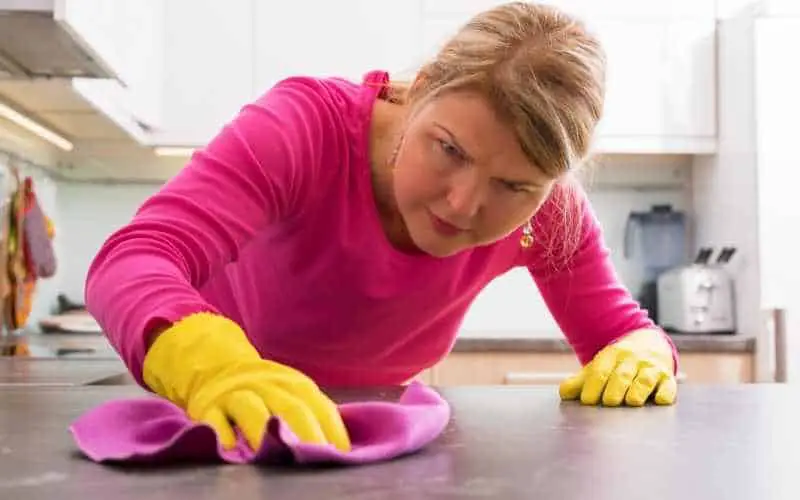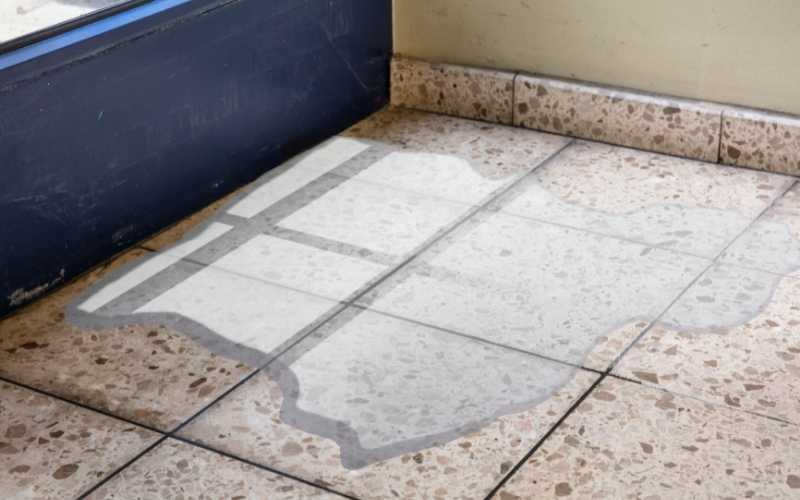Simply put, hard water has high mineral contents such as calcium, sulfates, bicarbonates, et cetera. Hard water is a problem that damages floor tiles and appliances, making them look unseemly.
Here is how to remove hard water stains from natural stones. You can use baking soda, salt, white vinegar, lemon juice, tooth paste and hydrogen peroxide to remove hard water stains.
Since the gradual build-up of limescale is because of the minerals present in water, regular floor cleaning liquids and detergents cannot remove it.
Also, it is paramount to consider the effect of hard water on the lathering process of soap, detergent, and shampoo, consequently making you use more of it.
Tile flooring is often the preferred choice amongst homeowners looking for a floor that requires little to no stress to maintain. Tile floors are strong, water-resistant, and durable.
However, natural stone needs special care, and tile grout/hard water stains pose a cleaning challenge.
Over time, deposits from hard water can turn into a scaly mineral build-up on the surface of your tile and degrade the appearance of your exquisite granite countertops.
Related: How to Clean Patio Tile
How to Remove Hard Water Stains From Natural Stones
Table of Contents
Hard water causes build-up on the faucets and, over time, leaves ugly stains on the tiles. This build-up often ruins everything from your appliances and plumbing to the tile and grout.
Hard water coats your tiles and grout with an iron and calcium deposit. Water from boreholes is the most significant contributor to hard water.
These deposits are initially undetectable to the human eye, but they layer over time when left unattended, producing ugly dark stains on your tile and grout.
Moreover, the brown stains on your tiles not only steal away the aesthetic appeal of your tiles but are also challenging to remove.
There are several answers to removing hard water stains from tiles and grout. In this article, we’ll be discussing some of them.
1. Baking Soda Paste
If the hard water build-up on your countertop has morphed into scales, it’s probably time to make a baking soda paste.
While it’s not generally wise to use abrasive cleaners on your natural stone or tiles, you can safely treat stubborn hard water stains with a paste of baking soda and water.
Only apply to the affected area, scrub it with a soft-bristled brush, rinse with water, and dry with a soft cloth.
Baking soda paste is our first answer to removing hard water stains from tiles and grout.
2. Salt
Salt is another beautiful answer to removing hard water stains from tiles and grout. Salt helps cut down the problematic hard water stains on your tiles or countertops.
Salt disinfects and can also kill the germs present in your bathroom. If you’re using salt for stain removal, make sure the countertop or tile is wet.
Sprinkle salt on the wet tiles and leave it for thirty minutes or more. Then scrub off the salt from the countertop using a sponge or brush. The longer the salt stays on the countertop, the more effective removing the stains.
3. White Vinegar
Vinegar is one of the most helpful kitchen ingredients you can use to remove hard water stains from your tiles and grout. This all-purpose cleaner is perfect for removing stains from your tiles and grout.
White vinegar is also known to prevent the growth of mold, germs, et cetera on your tiles—mix vinegar and water in equal proportion to make a solution.
Pour the solution into a spray bottle and sprinkle the solution on the tiles. Allow the solution remain on the tiles for a while before scrubbing off the solution using a brush or sponge.
If the stains prove too tricky to remove, add some baking soda to the solution. This makes white vinegar our third method to remove hard water stains on your tiles and grout.
Read: Pros and Cons of Pebble Shower Floor
4. Lemon Juice
On its own or when mixed with vinegar, salt, or any other ingredients, lime juice can be used to tackle tough water stains on tiles and grout.
To remove mineral deposits from taps, showerheads, and other appliances in the kitchen or bathroom, add a little salt to a lemon half and rub it on the surface.
5. Toothpaste
As surprising as this sounds, the fluoride toothpaste is quite effective against hard water stains on tiles or natural stones.
This unexpected effective ingredient provides a helpful answer to how to remove hard water stains from tiles and grout.
Apply toothpaste on a toothbrush, scrub the affected area in a circular motion, and let it rest for half an hour before cleaning with a wet cloth.
6. Hydrogen Peroxide (3%)
Hydrogen peroxide is a powerful cleaning chemical, even when diluted, so only use small quantities of the solution to remove the hard water stain on your tiles and grout.
It is corrosive, so endeavor to wash the surface particularly well with tap water as soon as the stain has disappeared.
If your stain is hard to remove, lay a cloth soaked with hydrogen peroxide over the stain. Let it sit for 1-2 hours.
Then, remove the cloth and scrub the stain. Before you use this technique to clean a stain in a visible area, try it out on a less visible area to ensure it won’t damage your tiles.
Read: How To Protect Floor From Potted Plants
Conclusion
Learning how to remove hard water stains from natural stones isn’t as difficult as some people would make you feel.
The longer the minerals remain on the surface, the more difficult it is to get rid of. It is crucial to act early to prevent them from building up.
A water softener also helps to reduce the chances of staining your tiles and grouts. You can install a water softener for the whole house or specific equipment to prevent damages such as stains and scales.
Softeners work by removing the minerals responsible for making the water hard and preventing stains on your tiles and grout. Acting early remains the most accessible way to remove hard water stains from your tiles and grout.
This article was written to help you understand every detail about hot to remove baking soda residue from wood floor and to make an informed decision when faced with the situation.
We hope you found it helpful; if you did, kindly share it across your entire social media pages.

